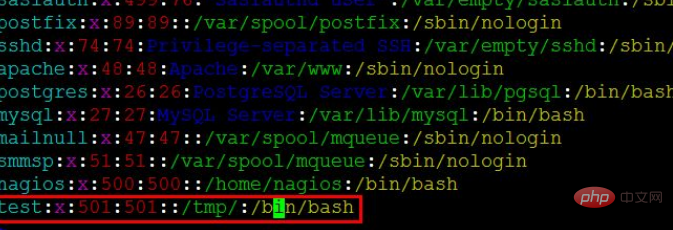 Operation and Maintenance
Operation and Maintenance
 Linux Operation and Maintenance
Linux Operation and Maintenance
 How to modify the user directory in Linux
How to modify the user directory in Linux
How to modify the user directory in Linux
How to modify the Linux user directory: 1. Use the "vi /etc/passwd" command to modify the "/etc/passwd" file to modify the user directory; 2. Use the usermod command to modify it, the syntax is "usermod - d username -u uid".

#The operating environment of this tutorial: linux7.3 system, Dell G3 computer.
How to modify the user directory in Linux
The first method:
vi /etc/passwd
Find the lines of the user you want to modify and modify them. This method is very violent and is recommended to be used with caution.
/etc/passwd file format
Login name: Encrypted password: Numeric user ID: Numeric group ID: Comment field: Starting directory: shell program
Use this method After modifying the user's host directory, certain exceptions will occur, such as: bash environment exception, you need to copy the hidden files in the user's original host directory to the changed host directory
cp /original host directory/ .*/Target directory

Second type: usermod
usermod -d /usr/newfolder -u uid
-u must be followed by uid, not username
Attachment: usermod detailed parameters
Syntax:
usermod [-LU][-c <备注>][-d <登入目录>][-e <有效期限>][- f <缓冲天数>][-g <群组>][-G <群组>][-l <帐号名称>][-s ][-u ] [用户帐号]
Supplementary instructions: usermod can be used to modify various settings of the user account.
Parameters:
-c
Modify the remark text of the user account. -dLogin directory> Modify the directory when the user logs in.
-e
Modify the validity period of the account. -f
Modify the number of days after the password expires before the account will be closed. -g
Modify the groups to which the user belongs. -G
Modify the additional groups to which the user belongs. -l
Modify the user account name. -L Lock the user password and make the password invalid.
-s Modify the shell used by the user after logging in.
-u Modify user ID.
-U Unlock the password.

Finally switch to the normal account and you will see that the current default directory has been changed.

Related recommendations: "Linux Video Tutorial"
The above is the detailed content of How to modify the user directory in Linux. For more information, please follow other related articles on the PHP Chinese website!

Hot AI Tools

Undresser.AI Undress
AI-powered app for creating realistic nude photos

AI Clothes Remover
Online AI tool for removing clothes from photos.

Undress AI Tool
Undress images for free

Clothoff.io
AI clothes remover

Video Face Swap
Swap faces in any video effortlessly with our completely free AI face swap tool!

Hot Article

Hot Tools

Notepad++7.3.1
Easy-to-use and free code editor

SublimeText3 Chinese version
Chinese version, very easy to use

Zend Studio 13.0.1
Powerful PHP integrated development environment

Dreamweaver CS6
Visual web development tools

SublimeText3 Mac version
God-level code editing software (SublimeText3)

Hot Topics
 What computer configuration is required for vscode
Apr 15, 2025 pm 09:48 PM
What computer configuration is required for vscode
Apr 15, 2025 pm 09:48 PM
VS Code system requirements: Operating system: Windows 10 and above, macOS 10.12 and above, Linux distribution processor: minimum 1.6 GHz, recommended 2.0 GHz and above memory: minimum 512 MB, recommended 4 GB and above storage space: minimum 250 MB, recommended 1 GB and above other requirements: stable network connection, Xorg/Wayland (Linux)
 Linux Architecture: Unveiling the 5 Basic Components
Apr 20, 2025 am 12:04 AM
Linux Architecture: Unveiling the 5 Basic Components
Apr 20, 2025 am 12:04 AM
The five basic components of the Linux system are: 1. Kernel, 2. System library, 3. System utilities, 4. Graphical user interface, 5. Applications. The kernel manages hardware resources, the system library provides precompiled functions, system utilities are used for system management, the GUI provides visual interaction, and applications use these components to implement functions.
 How to run java code in notepad
Apr 16, 2025 pm 07:39 PM
How to run java code in notepad
Apr 16, 2025 pm 07:39 PM
Although Notepad cannot run Java code directly, it can be achieved by using other tools: using the command line compiler (javac) to generate a bytecode file (filename.class). Use the Java interpreter (java) to interpret bytecode, execute the code, and output the result.
 vscode terminal usage tutorial
Apr 15, 2025 pm 10:09 PM
vscode terminal usage tutorial
Apr 15, 2025 pm 10:09 PM
vscode built-in terminal is a development tool that allows running commands and scripts within the editor to simplify the development process. How to use vscode terminal: Open the terminal with the shortcut key (Ctrl/Cmd). Enter a command or run the script. Use hotkeys (such as Ctrl L to clear the terminal). Change the working directory (such as the cd command). Advanced features include debug mode, automatic code snippet completion, and interactive command history.
 How to check the warehouse address of git
Apr 17, 2025 pm 01:54 PM
How to check the warehouse address of git
Apr 17, 2025 pm 01:54 PM
To view the Git repository address, perform the following steps: 1. Open the command line and navigate to the repository directory; 2. Run the "git remote -v" command; 3. View the repository name in the output and its corresponding address.
 vscode cannot install extension
Apr 15, 2025 pm 07:18 PM
vscode cannot install extension
Apr 15, 2025 pm 07:18 PM
The reasons for the installation of VS Code extensions may be: network instability, insufficient permissions, system compatibility issues, VS Code version is too old, antivirus software or firewall interference. By checking network connections, permissions, log files, updating VS Code, disabling security software, and restarting VS Code or computers, you can gradually troubleshoot and resolve issues.
 Where to write code in vscode
Apr 15, 2025 pm 09:54 PM
Where to write code in vscode
Apr 15, 2025 pm 09:54 PM
Writing code in Visual Studio Code (VSCode) is simple and easy to use. Just install VSCode, create a project, select a language, create a file, write code, save and run it. The advantages of VSCode include cross-platform, free and open source, powerful features, rich extensions, and lightweight and fast.
 Can vscode be used for mac
Apr 15, 2025 pm 07:36 PM
Can vscode be used for mac
Apr 15, 2025 pm 07:36 PM
VS Code is available on Mac. It has powerful extensions, Git integration, terminal and debugger, and also offers a wealth of setup options. However, for particularly large projects or highly professional development, VS Code may have performance or functional limitations.





